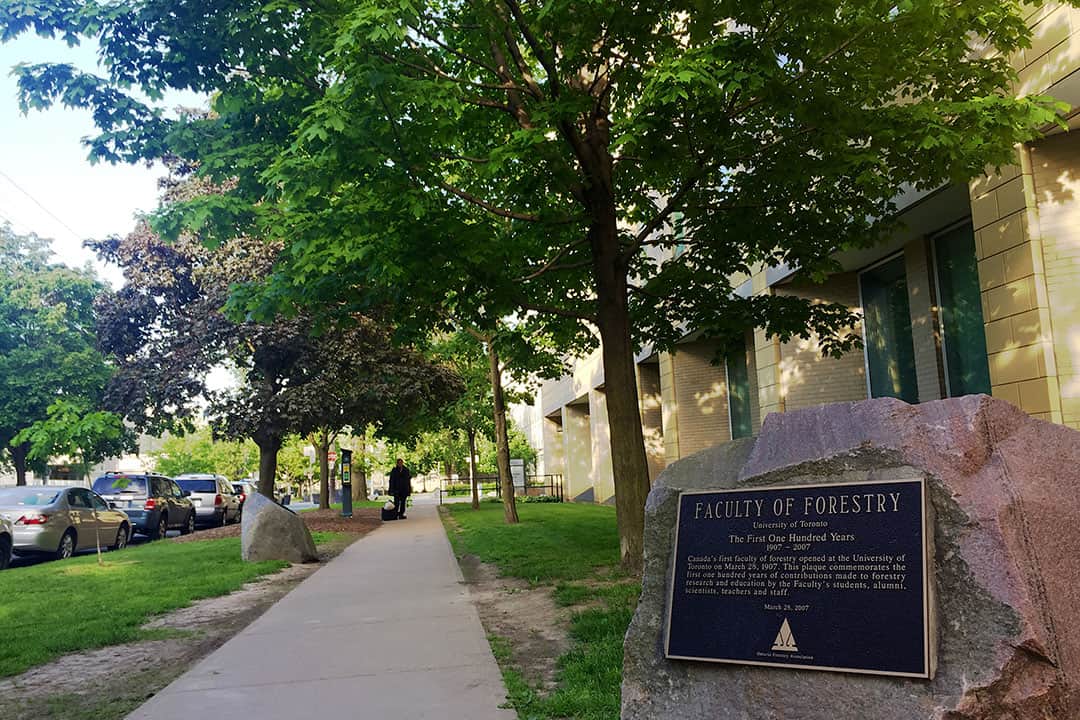U of T is in the final stages of its plan to eliminate the Faculty of Forestry and move its staff, faculty, students, and programs into the John H. Daniels Faculty of Architecture, Landscape, and Design as of this July. A news release from the university said that “The proposal would go through the governance process beginning on May 9.”
The abolition of the Faculty of Forestry as a standalone faculty is one of the worst ideas in U of T’s history. In an era of climate change, forests are the key to sustaining life on Earth. They sequester carbon, emit oxygen, filter precipitation, absorb rain, and protect ecosystems from erosion. We need forests. U of T should show pride in the Faculty of Forestry, and invest in it.
The Faculty of Forestry’s proud history began in 1907 as Canada’s oldest forestry faculty. Plaques displayed in the Earth Sciences Centre attest to the faculty’s men who gave their lives in World War I and World War II.
By the turn of the 20th century, settlers had cut down much of the forest on the Oak Ridges Moraine, and east to Northumberland County. The topsoil proved too thin to support agriculture and blew away, resulting in mass desertification and devastating annual floods in Port Hope and other communities.
Foresters knew what to do. They mobilized the government of Ontario to set up a network of tree nurseries across Canada. A massive, province-wide campaign to plant trees ensued. To this day, red pine plantations in a wide band of the northern GTA attest to the wisdom of this prescription. After the mass reforestation of the Ganaraska River Valley, the floods in Port Hope ceased. In 1968, Premier John Robarts planted the one-billionth tree: a sugar maple grown at the St. Williams provincial government nursery. Robarts also gave his name to the university’s flagship library.
Robert Wright was appointed as Dean of the Faculty of Forestry in July 2017. The university appointed him to abolish the stand-alone faculty, and he has worked hard to achieve that goal. During his first 18 months, the dean did not meet with forestry students as a group to discuss this goal or to solicit feedback. He held a town hall to discuss the restructuring only after the 34 students who enrolled in the Master of Forest Conservation in September 2017 had completed their course work and left the school.
Thus the assertion of the U of T provost, Cheryl Regehr, that “we are strongly committed to using these consultations to identify the best structure for forestry-related academic programs at the University of Toronto,” rings false.
In a recent open letter, my colleague Ben Filewod, a PhD candidate in forestry, spelled out some concerns over this transition. The Faculty of Forestry has gained recognition across Canada for its expertise in promoting the bioeconomy; for example, researchers have succeeded in making car parts out of nano-cellulose. Other research uses soil amendments to help forests, and other labs at U of T find new ways to defend forests from invasive species. One lab raises caterpillars who feed on invasive the dog-strangling vine.
Forestry companies and governments rely on the expertise of centres such as the Faculty of Forestry. A 2016 external review noted that “the University of Toronto’s program is designed to produce graduates qualified to move rapidly into research or managerial/policy-making roles.” Folding the faculty into a subordinate role in another faculty, with no dean to advocate on its behalf, risks reducing U of T’s leadership role in forestry research in Ontario. Schools in Quebec, New Brunswick, and British Columbia are ill-equipped to take its place.
Forestry overlaps with architecture in two areas: urban forestry and the use of wood in buildings and design. This leaves out, for example, the study of Ontario’s huge forested areas, the Great Lakes-St. Lawrence region, and the boreal forest that covers most of the province and generates tens of thousands of jobs.
Large, healthy, contiguous, diverse forests are more vital than ever to mitigate and adapt to climate change. We need a dedicated unit at the University of Toronto to tell the government how to enhance and improve our forests. The U of T community must wake up and save its Faculty of Forestry.
Peter Kuitenbrouwer will graduate with a Master of Forest Conservation from the Faculty of Forestry at the University of Toronto in June 2019.


